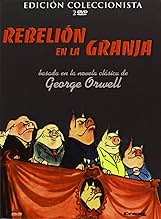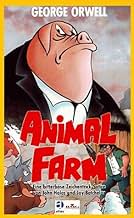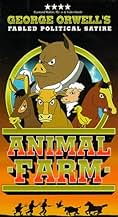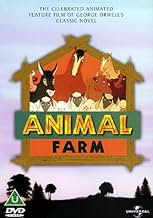Una revolución exitosa en el corral de los animales que viven allí contra el granjero sale terriblemente mal cuando los vencedores crean una nueva tiranía entre ellos.Una revolución exitosa en el corral de los animales que viven allí contra el granjero sale terriblemente mal cuando los vencedores crean una nueva tiranía entre ellos.Una revolución exitosa en el corral de los animales que viven allí contra el granjero sale terriblemente mal cuando los vencedores crean una nueva tiranía entre ellos.
- Dirección
- Guionistas
- Elenco
- Nominada a1 premio BAFTA
- 1 nominación en total
Opiniones destacadas
Animal Farm is as relevant today as the day it was written and perhaps for that reason it is very difficult viewing.
For those unaware the entire story is an allegory for the events leading up to the Russian Revolution of 1917 and then on into the Stalinist era of the Soviet Union.
It tells the story of the overworked animals on a farm who turn on their human master and make it their own only to watch the same thing happen again when one of the pigs becomes the very thing they had revolted against.
The animation style is that of the early Disney cartoons, it's over the top wacky and charming. The trouble is even though the movie is heavily comical and jovial it has several very alarming scenes and a very unnerving under current throughout.
Animal Farm is great viewing and devastatingly relevant across the world,if you're reading this then you are almost certainly experiencing it whether an overworked animal or maybe even a pig.
I rate Animal Farm a tad low perhaps, not because of the quality of content but purely because it's so hard hitting and not in a good way.
The Good:
Charming animation style
In places very sweet
Extremely well written and narrated
Powerful social commentary
The Bad:
Very difficult viewing
Things I Learnt From This Movie:
The animators went out of their way to make every humans nose look ridiculous
Mankind can make a movie to reflect society and how downtrodden most are, but still won't acknowledge it enough to act
The animation style is Disneyesque. The source material is George Orwell. The secret financial backing does alter the material but it is still compelling. The changes are political. As a movie, it is engaging. As propaganda, it is influencing.
Dealing with dictatorship, communist theory, military warlords, the democratic process and political theories, Animal Farm throws so much at the viewer / reader that it is still a highly acclaimed story. Whether it is suitable for a young audience, that is up to the individual viewer to decide.
Oh, I've heard the complaints about it not being wholly faithful to the source material. I'm going to apply the same defense here that I gave to "Gulliver's Travels": the film is the last place to look for accuracy. A wholly faithful adaptation would have no doubt turned everyone off, but what they have left behind is fascinating: despite an upbeat ending, the flavor of the novel remains intact. How many films can you say that about? The stinging satire is there, the political parallels are there, but a certain entertainment value is there that wasn't in the novel.
The ultimate message of the film leaves the viewer somewhat sad, according to my experience. But that's a good thing, I think. The film was animated by the British animator John Halas, whose short subject "The Christmas Visitor" is widely available on public domain but hardly seen. He retains much of the same style as he did in his earlier short and makes a strong and honorable film.
The box and ads say "Not for children." I think enlightened children will enjoy this film on one level and adults will enjoy it on an entirely different one.
If there's one thing wrong with this film, it's the ending. Orwell wrote an ending that was biting and necessary. By giving the film an upbeat ending, it somewhat undermines a first rate film. But I can't ignore the power of the previous 73 minutes, so I'm still recommending it.
***1/2 out of 4 stars
¿Sabías que…?
- TriviaMany parents were alarmed at the bleakness of the film, having taken their children thinking it was a film along the lines of a Walt Disney cartoon.
- ErroresAt one point the phrase "with sheets" is hastily added to the first rule, but in subsequent shots of the rules it is no longer there.
- Citas
[The laws of Animal Farm are being read]
Snowball: No animal shall drink alcohol. No animal shall sleep in a bed. Four legs good, two legs bad.
[The chickens are very annoyed at this rule]
Squealer: Wings count as legs.
[The chickens realize that Squealer is right]
Group of sheep: Four legs good, two legs bad. Four legs good, two legs bad.
Snowball: [continuing the reading of the laws] No animal shall kill another animal. All animals are equal.
- Versiones alternativasIn the Extended Edition (in the USA coming in October 2024), the only scene (after Squealer says "Long live Napoleon!" two times) shows all the animals and new animals cheering (cows, sheep, horses, pink pigs, llamas, chickens, peacocks, and goats) for Squealer before Benjamin runs away from Squealer and the barking dogs.
- ConexionesFeatured in La telaraña de Charlotte (1973)
- Bandas sonorasSnowball Banished
Written by Leopold Stokowski
Selecciones populares
Detalles
- Tiempo de ejecución
- 1h 12min(72 min)























